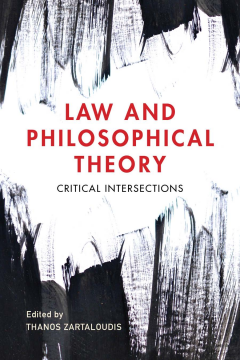
Additional Information
Book Details
Abstract
This important collection explores contemporary legal thought (and thought about the law more generally) in relation to its interdisciplinary critical engagement with philosophy, in particular continental philosophy. Over the last 25 years, many legal thinkers have increasingly and critically engaged with philosophical thought in ever explorative and innovative interdisciplinary ways. This book represents this rich and continuously developing interdisciplinary tradition within legal thought and legal study more generally.
Featuring both established and new voices, the volume explores a range of topics including: the relationship between law, philosophy and political theology; law and ecology; matter and legal technologies; contemporary governmentality; law’s relationship to violence; the so-called anti-juradicalism of post-1968 French theory; the normativity of social images; and responses to a time of perpetual crisis management. The approaches represented in this volume pose both long-standing and new questions in a genuinely critical manner in relation to contemporary legal (and associated political, social, economic and ethical) thinking.
In this timely collection of new and established scholars from across the world and from a variety of related disciplines, the problem of what we mean by ‘the law’ is held carefully in suspension so that it can be thought anew. The dazzling series of contributions breathe new life into mordant commonplaces about the role of law today. In this volume, we find a renegade group of thinkers who can help us all interrogate the law with the full critical rigor it deserves. It is essential reading for the critically-minded in any discipline, and any walk of life.
Iain MacKenzie, Centre for Critical Thought, University of Kent
Thanos Zartaloudis is a Reader in Legal Theory and History at Kent Law School, University of Kent. He is also a Lecturer and Doctoral Advisor at the School of Architecture of the Architectural Association in London. He has published widely in philosophy and law and legal history. His most recent book is The Birth of Nomos (Edinburgh University Press, 2018).
This splendidly diverse array of essays throws off the mantle of mastery and the dudgeon of the disciplines in a scintillating exercise in thinking law without law.
Peter Goodrich, Director, Program in Law and Humanities at Cardozo School of Law
Table of Contents
| Section Title | Page | Action | Price |
|---|---|---|---|
| Law and Philosophical Theory | Cover | ||
| Contents | v | ||
| An Introduction: Law and Philosophical Theory — Critical Intersections | 1 | ||
| 1 Illegalisms and the Law of Civil Society: From Foucault to Marx | 13 | ||
| 2 Foucault’s ‘Distrust of Legalism’: On Human Rights and the Revolution in Iran | 27 | ||
| 3 Actor-Network Theory and the Critique of Law | 45 | ||
| 4 Reopening the Archive: From Hypomnesis to Legal Ontology | 63 | ||
| 5 Notes on the Person and the Anthropological Machine of Law | 81 | ||
| 6 Immanentism and Incorporation: How Law Makes Corporations | 97 | ||
| 7 Icons of Control: Deleuze, Signs, Law | 113 | ||
| 8 Iconic Norms: A Theory of the Normative Nature of Images | 133 | ||
| 9 If Law Speaks, It Speaks of Enjoyment: Psychoanalysis and Desire | 149 | ||
| 10 Love, Law, Anarchism | 167 | ||
| 11 Law as Myth – On the Young Walter Benjamin | 183 | ||
| 12 The Being of the Volk: State, Führer and ‘The Political’ in Heidegger’s Seminars during the Kairos | 199 | ||
| 13 The Migration of Frontiers | 219 | ||
| 14 Elements of a Theology of Secularization | 235 | ||
| Index | 253 | ||
| About the Authors | 265 |
